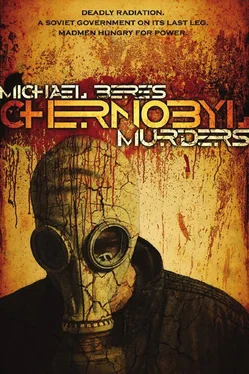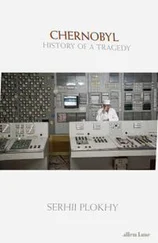Michael Beres - Chernobyl Murders
Здесь есть возможность читать онлайн «Michael Beres - Chernobyl Murders» весь текст электронной книги совершенно бесплатно (целиком полную версию без сокращений). В некоторых случаях можно слушать аудио, скачать через торрент в формате fb2 и присутствует краткое содержание. Жанр: Триллер, на английском языке. Описание произведения, (предисловие) а так же отзывы посетителей доступны на портале библиотеки ЛибКат.
- Название:Chernobyl Murders
- Автор:
- Жанр:
- Год:неизвестен
- ISBN:нет данных
- Рейтинг книги:4 / 5. Голосов: 1
-
Избранное:Добавить в избранное
- Отзывы:
-
Ваша оценка:
- 80
- 1
- 2
- 3
- 4
- 5
Chernobyl Murders: краткое содержание, описание и аннотация
Предлагаем к чтению аннотацию, описание, краткое содержание или предисловие (зависит от того, что написал сам автор книги «Chernobyl Murders»). Если вы не нашли необходимую информацию о книге — напишите в комментариях, мы постараемся отыскать её.
Chernobyl Murders — читать онлайн бесплатно полную книгу (весь текст) целиком
Ниже представлен текст книги, разбитый по страницам. Система сохранения места последней прочитанной страницы, позволяет с удобством читать онлайн бесплатно книгу «Chernobyl Murders», без необходимости каждый раз заново искать на чём Вы остановились. Поставьте закладку, и сможете в любой момент перейти на страницу, на которой закончили чтение.
Интервал:
Закладка:
“Now what?” said Nikolai.
Pavel shut off the engine. “I’ll go on foot. I’m tired of driving anyhow. We have to follow through on this, or we’ll have no reason for having left Pripyat without orders. Stay in line. You’ll get through eventually. I’ll meet you at the KGB branch office tomorrow. If I can’t get away, I’ll call and leave a message for you at Major Komarov’s office so you can pick me up.”
Pavel got out of the car, and Nikolai slid behind the wheel.
“You want me to go to Komarov’s office?” asked Nikolai.
“Of course. Without Captain Putna around, we’ll need further direction. Komarov’s orders put Juli Popovics under observation.
Think big, Nikolai. This could be our opportunity for promotion.
Perhaps the Gypsy Moth information for Major Komarov will bear fruit.”
“What information? All we have from Captain Putna is a hint about someone called Gypsy Moth trying to destabilize the country.”
“Komarov is pushing for information. We’re his contacts directly from the Chernobyl area. If we don’t find anything by following Juli Popovics, we’ll think of something.”
It was a kaleidoscope of conversation as Juli walked between cars and buses.
Some pondered apocalypse-the Soviet Union was falling apart.
Environmental advocates had been right all along. It was the end of the world. Christ would come down the following Easter Sunday and take the faithful with him. Because birds fly to heaven in winter, and few had been seen in the area, the birds knew not to return.
Others pondered rumor and myth-alcohol flushed radiation out of one’s system. Operators at the plant smoked hashish. The iodine at most pharmacies was gone. Some evacuees were seen burying their valuables because looters were already waiting in the woods like wolves. Party bosses knew about the accident before it happened. How else would they have been prepared to speed out of town in their Volgas?
Because most cars and buses had turned off their engines and lights, the walk between the two lines of traffic was dark. The only light came from flashlights or lanterns aboard buses, the glow of cigarettes, and the bright lights of the checkpoint shining through the dust and haze in the distance. As Juli neared the checkpoint, more and more people joined her, sometimes bumping into her or stepping on her heels. Beyond the lights of the checkpoint, she saw the change in landscape, the downslope of the river valley, and finally, the lights of Kiev.
There was chaos at the roadblock. The few people who wanted to leave Kiev were turned back by Lazlo’s men, and the hundreds arriving from the north were being allowed into the city only if they had a specific destination. Those without a destination were directed to the Selskaya collective farm thirty kilometers west of the city.
Lazlo’s men had already sent several hundred to the Selskaya farm, and now he awaited further orders.
Some local Kievians trying to exit the city to outlying areas complained the so-called accident at Chernobyl was nothing but an excuse for evacuees to head south for holiday. Others claimed officials in Kiev must have known about the accident earlier than everyone else because they kept their children out of school Saturday and started their weekend early, going to their dachas. One man said he’d seen scores of fire trucks head north Saturday. When Lazlo heard this, he recalled his meeting with Lysenko earlier in the day and wondered if there was a reason Lysenko had not given him more details of the enormity of the accident.
Lazlo showed photographs of Mihaly, Nina, and the girls to his men, but no one had seen them. But with the chaos, anyone could slip through unnoticed. When a group of Young Pioneers arrived to help, Lazlo showed them the photographs while instructing them to direct traffic and make sure no one got out of line and blocked the lanes out of the city. Whereas few vehicles were allowed out of the city earlier in the evening, now trucks and emergency vehicles whose drivers had been given passes headed north.
The crowd of people who had left cars and buses grew to an alarming size. Eventually, because there were no fences or other boundaries on the sides of the road, the crowds from both sides merged, making it impossible for the militia to stop those on foot from crossing in either direction. Lazlo tried in vain to help his men maintain order. During this confusion, he was unaware of his brother’s lover crossing into Kiev followed by a KGB agent a few meters behind her beyond the lights of the roadblock.
Other KGB agents at the scene were also unaware of the crossing.
Two of them, recruited to Kiev from their Romanian border-guard posts, sat in the dark in a black Chaika with yellow fog lights a half kilometer from the roadblock watching Chernobyl refugees pass by on their way into Kiev. Both agents wore their green border-guard uniforms.
One of the agents lit a cigarette. “I don’t understand about Komarov.”
“What about him?” asked the other.
“There’s an accident at Chernobyl, and instead of going to the scene, he stays in Kiev and searches for suspects.”
“Bigger fish have already volunteered for the medals they’ll get at Chernobyl. Komarov is from the old KGB. He’s already got interrogators working on the poor souls they flew to Moscow, and he’s got us watching his suspects here.”
“So you think Detective Horvath is a suspect?”
“He must be. Otherwise why would we be assigned to watch him?”
Pavel followed Juli Popovics through the mass of angry people.
Voices were raised in protest and dismay at what had happened at Chernobyl. As in any crowd where one achieves momentary anonymity, many spoke out against the authorities and against their insistence the population be left in the dark. At one point, a shoving match broke out, and Pavel was actually pushed into Juli Popovics, knocking her down. He helped her up, excused himself, dropped back into the crowd, and continued following her.
Farther away from the roadblock, Pavel kept his distance. Because she was carrying an overnight bag, it was easy to follow her.
The only time he had difficulty was when she descended the stairs to the Kiev metro. He had to run in order to catch the train.
She exited the metro in central Kiev at Khreshchatik Station.
From there he followed her to the Hotel Dnieper. It was one in the morning. Pavel watched from a corner in the lobby. Juli Popovics apparently tried to register for a room, but was refused. The lobby was crowded with people unable to get a room. So, along with dozens of others, Juli Popovics and Pavel of the PK waited for someone to vacate a comfortable chair or sofa so they could settle in for the night.
Juli Popovics was first to find a chair. Pavel lingered near an open stairway to the second floor. He went halfway up to the landing and sat on a stair at a spot where he could keep an eye on Juli Popovics through an opening in the ornate railing. Glancing behind him, he saw a statue of Vladimir Ilich Lenin in the corner of the landing. Lenin held his hand up as if pointing the way up the next flight of stairs. Pavel wondered if following Juli Popovics here had been the right thing to do. Was there any chance he and Nikolai would even meet Major Komarov? Pavel whispered to himself,
“What now, Uncle? Climb the stairs to promotion?” Pavel chuckled, then turned back to watch Juli Popovics, who had closed her eyes.
From conversations overheard during the night, it was obvious even here, in Kiev, with all its newspapers and radio and television stations, no one knew exactly what had happened at Chernobyl.
With a news blackout of such magnitude, it was not difficult to sur-mise a disaster had occurred. For, as any Soviet citizen knows, the less the news, the greater the story.
Читать дальшеИнтервал:
Закладка:
Похожие книги на «Chernobyl Murders»
Представляем Вашему вниманию похожие книги на «Chernobyl Murders» списком для выбора. Мы отобрали схожую по названию и смыслу литературу в надежде предоставить читателям больше вариантов отыскать новые, интересные, ещё непрочитанные произведения.
Обсуждение, отзывы о книге «Chernobyl Murders» и просто собственные мнения читателей. Оставьте ваши комментарии, напишите, что Вы думаете о произведении, его смысле или главных героях. Укажите что конкретно понравилось, а что нет, и почему Вы так считаете.












